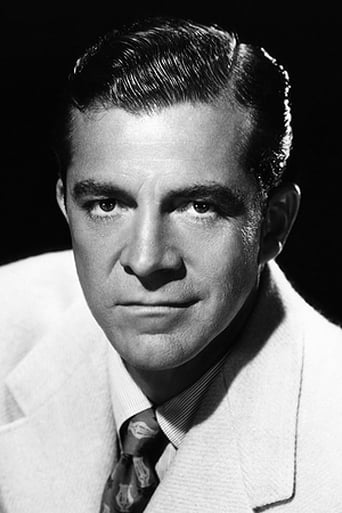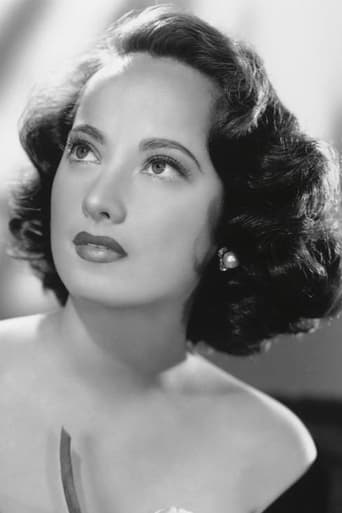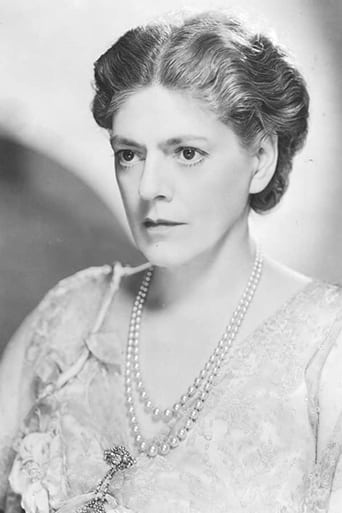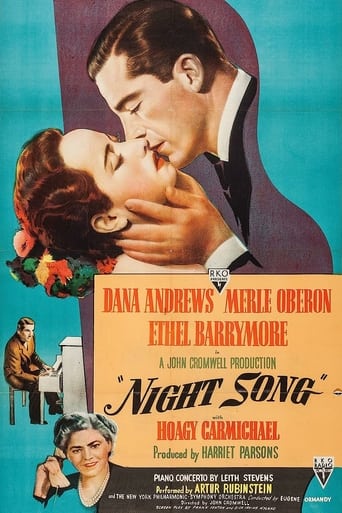
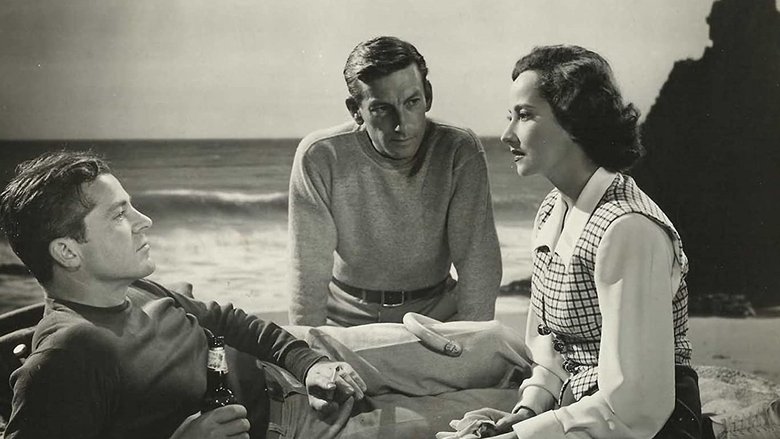
Night Song (1948)
A socialite pretends to be poor and blind in her plan to help a blinded pianist.
Watch Trailer
Cast


Reviews
NIGHT SONG might only appear to be a routine example of the kind of postwar romance that most of the major studios produced. A blind bar pianist (Dana Andrews) is taken up by a wealthy socialite (Merle Oberon), who pretends to be blind herself in order to secure his confidence. After a courtship in San Francisco, the pianist is given sufficient financial backing to have an operation to restore his sight, and receive a concert premiere of his new concerto at Carnegie Hall, New York. He returns to San Francisco, where he meets his beloved, and the two them vow eternal love.Frank Renton and Dick Irving Hyland's screenplay contains its fair share of intertexts. The idea of a concert performance dates back to Brian Desmond Hurst's huge British wartime hit DANGEROUS MOONLIGHT (1941), that contained the premiere of Addinsell's "Warsaw Concerto," while Andrews's predicament as a war-scarred survivor cross- references Goldwyn's THE BEST YEARS OF OUR LIVES (1946), in which the actor had given an equally memorable characterization in a similar role.Yet nonetheless NIGHT SONG possesses a certain integrity. Director John Cromwell establishes a close bond between Andrews and his boon companion Chick (Hoagy Carmichael, who even gets a solo number), and by doing so suggests the importance of male bonding in an often uncertain world. No one, it seems, knows really what to do with the peace, after having won the war; the only outlet both men can find is playing bands in some cheap SF dive bars.This relationship is contrasted with the more spiky friendship between Oberon and her boon companion Miss Willey (Ethel Barrymore). The grande dame of the American theater gives one of her more commanding characterizations as a supposed cynic with a heart of gold, who readily understands the agonies her younger friend experiences as she tries to woo the pianist without hurting his feelings. In an environment where people seldom gave vent to their emotions in public, emotional expression is put at a premium.The end of the movie is enlivened by a live performance from Leopold Stokowski and Eugeme Ormandy playing themselves with the New York Philharmonic Orchestra. They do not have to do much, but they set about delivering the concerto (with music by Leith Stevens) with a conviction and gusto that is truly refreshing.
In a brief triumph of hope over knowledge I entertained fleetingly the notion that this just might be a movie version of Cliff Odets' Night Music, his 1940 play whose failure in 1940 led to the demise of the charismatic Group Theatre out of which emerged so many lustrous talents both behind - Odets himself, Harold Clurman, Lee Strasberg, Elia Kazan - and in front of the camera - Kazan again, Lee J. Cobb, Franchot Tone, John Garfield. In the event, of course, Night Song is a totally different affair improbably cast and with more holes than a Swiss cheese - for example Hoagy Carmichael leads a 'swing' band with a residency in a night club in San Francisco in which Dana Andrews is the blind pianist; we never hear the band playing anything remotely resembling swing and after the first reel we never see the band or the club again concentrating instead on the unlikely quartet comprising the two men plus Merle Oberon and Ethel Barrymore. Having fallen for Andrews on sight (sorry about that) whilst 'slumming', society dame Oberon affects blindness of her own to win Andrews love. His condition can, of course, be cured in a heartbeat but it will take major bucks and a surgeon in New York. He thinks that Oberon hasn't got change of a match and wouldn't take her money even if he knew she was really Miss Gotrocks but love of course will find a way. Oberon 'creates' a music competition with five K (this is 1947) for the best classical competition and arranges for Andrews to win it. Do I really need to go on? If you can get past this hoke and more - and yes, there IS more, I kid you not, then chances are you'll enjoy it.
The job of a movie is to give the audience members a bigger slice of life than they would normally experience. Night Song, a classic movie of the post-war 1940's, gives that slice of life with rare grace, elegance and style. Critics have panned it because of the "bad" far-fetched plot, the "bad" music, and "bad" acting.I like this movie because, quite coincidentally, I personally have digested many of the slices of life in the "far-fetched" plot. The movie is about a piano player/composer who is struck on the head in the prime of his life. I am a piano player/composer who was struck on the head in the prime of my life. We both made it through a war era untouched, he WWII, and I Vietnam, well almost. He is living hand to mouth with his best friend. I am also living hand to mouth with my best friend, my wife. For those who love far-fetched coincidences: The composer's last name is Evans—my grandfather's name before he changed it. The movie was probably shot in 1946, the year I was born. Exactly 20 years later I saw Artur Rubenstein, who acted and performed in this movie, in a concert at the Music Center in Los Angeles--the only time I ever went to such a concert. It opened in Sweden on my birthday. What could be more far-fetched?. The not so far-fetched plot twists were not lost on me. As I watched, I was saying to myself, "What is possible for me? Miracles happen every day! Every success story was improbable before it happened!" After watching the film, I went over to the piano and played my own unfinished concerto once again! As for the Leith Stevens music, if you didn't like it, say so. If it didn't touch you, say so. I liked it, immensely. It touched me immensely! If you want a thrill, type in Leith Stevens on IMDb. You'll find page after page of musical credits—right up to 2005! The man is a modern master composer played by the greatest performers of that time in this movie! Not bad for "bad" music! The job of film critics is to say what they like and dislike about films and why. They should leave all categorical good and bad thoughts completely out of the conversation.One measure of the talent of an actor, and some say the only measure of a film, is the ability to transport the mind and the spirit of the viewer to another time and place. I was completely transported by this movie. I was perfectly comfortable with ALL the performances, by some of the most distinguished actors of the era, because I was ready, willing and able to be transfixed; and this film is transfixing! Let's get it on DVD!
They used to show it on Turner Classic Movies on Ethel Barrymore's birthday (when they would show all of her movies). It contains a wonderful original mini-concerto by film composer, Leith Stevens, written just for this film. I think this movie is wonderful, in part, because it really exemplifies the best sort of films that glamorize classical music and not only give the film-goer a glimpse into the life and excitement of being a musician, but a peak into the collaborative creative process, itself. Many of these films were made in the '30s, '40s and '50s. They are rarely made now; usually films about musicians, especially about classical musicians, alienate the audience from the artists rather than inspiring empathy and a desire to emulate the stars on screen. Also, such clever and moving plots in love stories are fairly rare now. Ironically, it has wonderful scenes where Hoagy Carmichael takes dictation for the blind composer but in real life, Hoagy Carmichael, one of the great jazz musicians of the 20th Century, could not read music. I wonder if the plot was inspired at all by the fate of the '20s Jazz Great, Bix Beiderbeck, who drank himself to death at a young age because he found it increasingly hard to get work in the Paul Whiteman-inspired era of big bands who played from written parts. It also has some wonderful quotable one-liners and great, even profound dialogue, I wish it were available. That a film with such a star-studded line-up should be completely out of print is astounding: Dana Andrews, Merle Oberon, Hoagy Carmichael, Ethel Barrymore, the great pianist, Arthur Rubenstein (who even has a couple of lines), the great Conductor, Eugene Ormandy, and the New York Philharmonic, as it was at its peak at the end of the '40s. There is a lot that is original in this film. For example, The scene in which Dana Andrews gives Merle Oberon a piano lesson is an amazing look at what brilliant interpretation based on musical maturity and advanced education can accomplish. Merle Oberon plays Chopin perfectly but mechanically, and then Dana Andrews plays it perfectly but brings it to life. We hear it from the kitchen along with Carmichael and Barrymore. She tells him archly that she doubts there is much he could teach her, as we hear it the first time together with them, and the second time, he tells her, matching her archness, exactly, "looks like she is improving already." One can neither rent nor buy Night Song. I wonder if it was issued on VHS. I just saw that a 16 mm copy went at auction for several hundred dollars on E-Bay. Pity.


